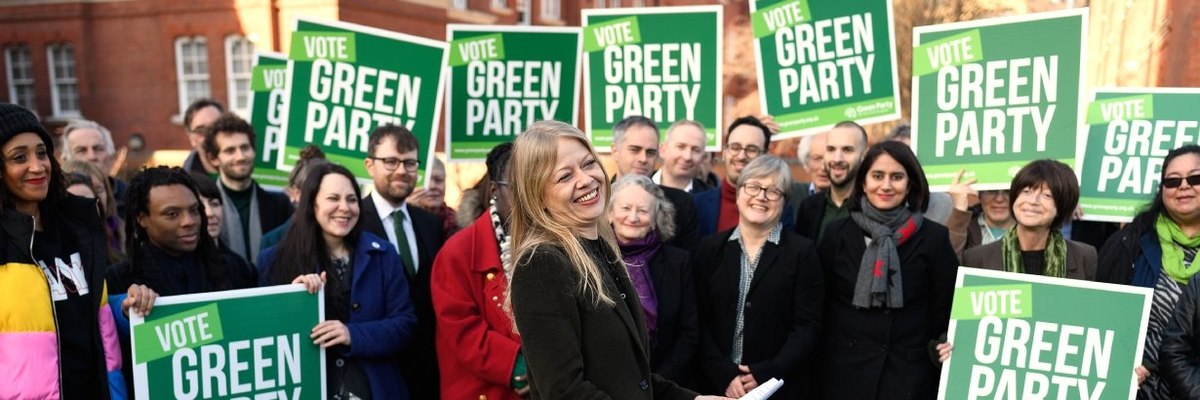With the Green Party of England and Wales due to elect its new leaders later this month, a new YouGov poll of 605 current members investigates the views of its members across a range of different issues.
Outgoing leaders Sian Berry and Jonathan Bartley regarded highly by members, but Caroline Lucas more popular
Sian Berry and Jonathon Bartley’s reign as co-leaders ended in July when Bartley stepped down, with Berry staying on as acting leader until later this month. Reflecting on their three-year stint, Green members are generally positive, with nine in ten (92%) saying as a pair they’ve well, including 34% who think they’ve performed “very well”.
The Green co-leaders are viewed positively individually too, with 87% having a favourable opinion of Bartley (including 42% “very favourable”) and 91% having a positive view of Berry (including 49% “very favourable”).
The Green Party’s sole MP and former leader, Caroline Lucas, is viewed favourably by 96% of members. What is particularly impressive about Lucas’s numbers, though, is that 84% view her “very” favourably.
Looking at views of other parties’ leaders, just 8% of Green party members have a favourable view of Boris Johnson, with 93% having an unfavourable view (including 88% who say “very unfavourable”). Keir Starmer is viewed more favourably, but proves divisive: 52% of Green members have a positive view of him compared to 46% who view him unfavourably. He is, however, less popular among Greens than his predecessor: Jeremy Corbyn is seen favourably by 63% to 36%.
Green members would be happy to enter a coalition with Labour, but would also be pleased with a Labour majority
A coalition including the Green Party in Germany looks like a very real possibility as the general election there approaches. Here in the UK, there is strong appetite amongst Green Party members to enter a coalition government if the opportunity were to arise. Over eight in ten (84%) would either be delighted (41%) or pleased (43%) if a Labour-Green coalition were to happen at the next election. There is also strong support for a coalition government with Labour and the SNP (79%).
Half of Green members (51%) would even be happy with a Labour majority government at the next election, with 31% not really minding this outcome and just one in five saying they’d be disappointed (14%) or dismayed (4%). This is perhaps in part due to their hostility toward the Conservatives. Almost all members (93%) say they would be dismayed (84%) or disappointed (9%) if the Tories were to remain in power after this election cycle, with just 2% saying they’d be happy with this outcome.
There is also very little appetite amongst Green members for the Conservatives being their party’s route to government. Just 8% would be pleased with a Conservative-Green coalition; 78% say they’d be disappointed or dismayed.
It’s the environment, stupid
It will come as little surprise that the environment (86%) tops the list of the most important issues Green Party members see as facing the country, followed by health (52%) and Brexit (41%). By contrast, just 31% of the general public consider the environment a top issue, which puts it in fourth place overall.
Compared to the wider public, Green members are much more likely to see Brexit (41% vs 26%) and housing (23% to 15%) as a main concern, and less likely to list the economy (16% to 38%), immigration (9% to 35%), defence (4% to 12%) and crime (2% to 14%).
While its clear the environment is the top concern for members, they do not feel the Greens should be a single issue party. Just 17% think it should focus its time and energy just on the environment and climate change, compared to four in five (79%) who think it is important to offer a wide range of policies across different areas.
Climate change needs to be prioritised now, but Green members have little faith that COP26 will result in significant action
When it comes to tackling climate change, Green members are much more likely to favour urgent action than the public overall. Nine in ten (90%) think it should be a top priority now in terms of government spending, even if cuts are needed elsewhere, compared to just 3% who think there are other more important spending priorities. The British public split 43% to 31% on this trade off.
Looking at specific policies to tackle climate change, 92% of members support the banning of petrol and diesel cars, a policy already due to come into force in 2030. The wider population are split on this policy, with 44% supporting it compared to 45% opposed.
There is also support amongst many Green members for more extreme policies to tackle climate change. A majority (55%) would support banning all air travel for leisure purposes, while members only marginally oppose banning the sale of all meat and dairy products (50% oppose, 45% support). In contrast, British adults oppose banning air travel for leisure by 73% to 17% and oppose banning meat and diary by 82% to 10%.
Given the high levels of support for banning meat, it is unsurprising that Green party members are far more likely to be vegan (16%) or vegetarian (18%) than the British public overall (2% and 5%, respectively).
Green members are far more aware of the COP26 UN Climate Conference taking place in November than the general public, with 79% saying they have heard a great deal or a fair amount about it compared to 23% of Brits. They do align with the public when it comes to their pessimism about the overall outcomes though, with 77% saying it is unlikely to result in any significant action being taken (63% of the public say the same).
Green members back the actions of Extinction Rebellion far more than the public
Extinction Rebellion co-founder and current candidate for Green party leader, Tamsin Omond, will likely be pleased to hear that four in five (80%) of Green Party members support the campaigning methods of the activism group when it comes to climate change, with just 7% opposing them. This is in complete contrast to the general public, who oppose the organisation’s methods by 52% to 11%.
Members also trust the organisation on the environment in general by 88% to 10%, though not as much as they trust the Green Party (97% to 3%). The Labour Party are trusted on the environment by 47% of Green members, although slightly more 52% say they do not trust the party.
See full results here









